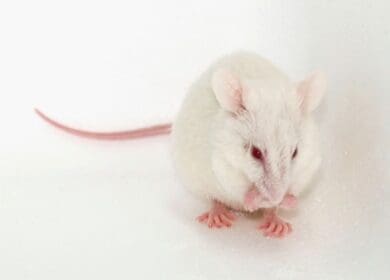NSG mice
NSG mice
| Strain details | |
|---|---|
| Nomenclature | NOD.Cg-Prkdcscid ll2rgtm1Wjl /SzJ/Ozarc |
| Common name | NSG |
| Synonyms | NOD-scid IL2Rgammanull, NOD-scid IL2Rgnull,NOD scid gamma |
| Strain | Congenic, Spontaneous mutation, Targeted mutation |
| Coat colour | Albino (A/A Tyrc /Tyrc ) |
| Species | Mouse |
| Genetic background | NOD/ShiLtJ |
| JAX stock number | 005557 |
| Location | Area Oz1 |
| Weekly wean target | 100 males,100 females |
Strain description
- MHC haplotype: H2Kg7
- NSG mice do not express the Prkdc gene nor the X-linked Il2rg gene.
- The mice are viable, fertile, normal in size and do not display any gross physical or behavioral abnormalities.
- NSG mice lack mature T cells, B cells, or functional NK cells, and are deficient in cytokine signaling, leading to better engraftment of human hematopoietic stem cells and peripheral-blood mononuclear cells than any other published mouse strain.
- NSG mice exhibit a progressive hearing loss that is already severe by three months of age. Due to their level of immunodeficiency NSG mice need to be maintained in a ‘maximum barrier’.
- This strain is only available for Australian and New Zealand researchers.
- These double mutant mice were produced by breeding female NOD.CB17- Prkdcscid /J mice with male mice bearing the X-linked B6.129S4-Il2rgtm1Wjl /J allele. The resulting male mice heterozygous for the Prkdcscid allele and hemizygous for the Il2rgtm1Wjl allele were crossed to female NOD.CB17- Prkdcscid /J mice for eight generations.
- Heterozygotes were interbred to produce mice homozygous for the Prkdcscid allele and homozygous (females) or hemizygous (males) for the Il2rgtm1Wjl allele.
- NSG strain is imported from JAX into Animal Resource Centre (ARC) in 2021.
- The stock strain is transferred to Ozgene ARC in 2023.
- Recent publications have demonstrated this strain’s outstanding utility in the studies of islet transplantation, hematopoietic stem cells and cancer stem cells.
Past ARC and transfer reports:
Current Ozgene ARC reports (from 01-Jun-2023)
- This strain is housed in Area Oz1
- Please see Oz1 health reports on our Biosecurity page
- Ozgene ARC terms and Conditions
- Subject to The Jackson Laboratory’s Conditions of Use and the Australian Patent Number (2004268530). Information regarding conditions of use is available at: JAX General Terms and Conditions
- This strain is subject to additional use restrictions:
- Notice regarding distribution of this strain to companies and/or for commercial use (#8).
- Use of MICE by companies or for-profit entities requires a no-fee JAX Leap License prior to shipping.
- JAX mice are the gold standard for animal model research
- Mouse images are representative only. Actual phenotypes may vary based on genotype, sex, age, husbandry, health status, and other factors.
- Coughlan AM, et al. Stem Cells Dev. 2016 Apr 1;25(7):530-41. PMID: 26879149 doi: 10.1089/scd.2015.0289 Myeloid Engraftment in Humanized Mice: Impact of Granulocyte-Colony Stimulating Factor Treatment and Transgenic Mouse Strain.
- Shultz LD, et al. J Immunol. 2005 May 15;174(10):6477-89. PMID: 15879151 doi: 10.4049/jimmunol.174.10.6477 Human lymphoid and myeloid cell development in NOD/LtSz-scid IL2R gamma null mice engrafted with mobilized human hemopoietic stem cells.
- The Jackson Laboratory. 2018. Frequently Asked NSG Questions. Available at: https://www.jax.org/jax-mice-and-services/find-and-order-jax-mice/nsg-portfolio/frequently-asked-nsg-questions.
- More info https://www.jax.org/strain/005557
NSG mice
The NSG strain, also known as NOD scid gamma is a stock strain that is extremely immunodeficient, lacking mature T cells, B cells and Natural Killer (NK) cells. These mice carry two mutations on the NOD/ShiLtJ genetic background; severe combined immune deficiency (scid) and a complete null allele of the IL2 receptor common gamma chain (IL2rgnull).
The inbred NOD/ShiLtJ genetic background in NSG strain contributes several immunodeficiency characteristics. These include the absence of a functional hemolytic complement system, diminished dendritic cell functionality and impaired macrophage activity. The NOD background carries an allele of the Sirpa gene, which significantly enhances the bone marrow’s ability to support the colonisation and engraftment of human hematopoietic stem cells.
- The Prkdcscid mutation, known as scid (severe combined immunodeficiency) essentially eliminates adaptive immunity. This mutation is a loss-of-function change in the mouse equivalent of the human PRKDC gene, which is responsible for coding a protein that repairs DNA strand breaks during V(D)J recombination in developing T and B lymphocytes. Mice that are homozygous for this mutation are deficient in B and T cell.
- The IL2rgnull mutation prevents cytokine signalling through multiple cell surface receptors, which is crucial for the differentiation and functional development of NK cells. This condition creates an environment conducive to the engraftment and study of human cells in NSG mice without being immediately attacked by the host’s immune system.
The severe immunodeficiency allows the mice to be humanized by engraftment with human CD34+ hematopoietic stem cells (HSC), peripheral blood mononuclear cells (PBMC), patient derived xenografts (PDX), or adult stem cells and tissues. The immunodeficient NSG mice enable research in human immune function, infectious disease, diabetes, oncology and stem cell biology.


